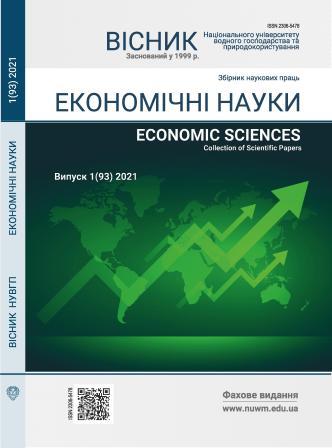FORMALIZATION OF THE INTELLECTUAL THEORY OF VALUE
DOI:
https://doi.org/10.31713/ve120215Keywords:
value, worth, price, additional value rate, profit rate, intellectual capital, intellectual theory of value.Abstract
Current research is an attempt to formalize a new intellectual theory of value by interpreting Marx's labour theory of surplus value from the position of breaking down the additional value by sources of its creation, namely: labour capital and intellectual capital. For this purpose, the factors of these sources exploitation in the value creating process were introduced. A dialectical synthesis and decomposition of categories "value", "worth" and "price" was proposed, based on the methodology of phenomena causality in terms of their perception by the subjects of the value creation in the processes of production and exchange. It was determined that the value is an objective worth of the product and is general for both systems of its perception, which are contrast from the point of view of the market sectors.Subjective worth lies but in the plane of individual perception of value by thesubjects of its creation and consumption in the process of production and / or exchange. At the same time, the subjective worth of the goods has a dual nature, the objective basis of which is the two-sided essence of exchange:from the position of the goods consumer it manifests itself as a personal utility, which is determined by the individual, based on the possibility of satisfying their specific needs, preferences, budget restraints, etc; for the manufacturer or seller, the subjective worth of the goods is represented by the possibility to satisfy their economic needs: obtaining income, additional value in the process of its implementation. It was substantiated that, the value is an objective basis for the subjective worth formation from the buyer and seller's (manufacturer) positions (or their plurality), the conflict of which is solved in the market by the interaction of represented accordingly demand and supply, and the result of solving this conflict becomes an arrangement of those subjects of exchange about the unified (de-subjective) worth (value) – the market. Given the proposed economic structure of value, apparent becomes the desire of the vast majority of entrepreneurs for automation of production and thus reduction of physical labour costs, which is an elementary method of increasing the share of additional value, that is, profits, in the gross income of the enterprise (newly created value). At the same time, this obvious desire results in the intellectual and technological transformation of productive forces due to entropy of technology in all spheres of social life and this consequential change in the structure of production factors transforms in turn the structure of value. The conducted research allowed to formalize hypothetically the intellectual theory of value. At the same time, further research is required to develop the methodological tools, which will allow to define the intellectual capital factor limits i in the newly created value.References
Schumpeter J. The Theory of Economic Development. Cambridge; Harvard, 1934.
Yereshko Yu. O. Ekonomichna teoriia intelektualnoho kapitalu: intelektualna teoriia vartosti. Ekonomika i upravlinnia. 2016. № 4. S. 5–9.
Marks K., Engels F. Kritika politicheskoy ekonomii : sochineniya. 2-e izd. M., 1968. T. 46. CH. І. S. 256–301.
Smith, Adam. An Inquiry into the Nature and Causes of the Wealth of Nations. 1776. Book 2.
Hobbes, T., & Missner, M. (2016). Thomas Hobbes: Leviathan (Longman Library of Primary Sources in Philosophy). Routledge.
Johnson, D. M. (2021). Xenophon’s Socratic Works: The Other Socrates.
Malthus, T. R. (1827). Definitions in political economy. Online Library of Liberty.
Marx, K. (2007). Capital: A critique of political economy. Duke University Press.
Clark, J. B. (1888). Capital and its Earnings. American economic association. Vol. 3, No. 2.
Yereshko Yu. O. Vybir amortyzatsiinoi polityky z tochky zoru upravlinnia konkurentospromozhnistiu investytsiinoho proektu. Formuvannia rynkovykh vidnosyn v Ukraini. 2013. № 9. S. 181–183.

